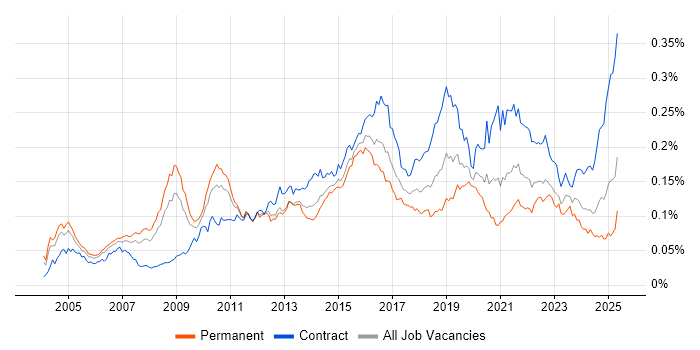Integration Architect
UK
The median Integration Architect salary in the UK is £95,000 per year, according to job vacancies posted during the 6 months leading to 16 May 2025.
The table below provides salary benchmarking and summary statistics, comparing them to the same period in the previous two years.
| 6 months to 16 May 2025 |
Same period 2024 | Same period 2023 | |
|---|---|---|---|
| Rank | 683 | 831 | 891 |
| Rank change year-on-year | +148 | +60 | +192 |
| Permanent jobs requiring an Integration Architect | 28 | 64 | 88 |
| As % of all permanent jobs advertised in the UK | 0.050% | 0.065% | 0.088% |
| As % of the Job Titles category | 0.056% | 0.068% | 0.096% |
| Number of salaries quoted | 15 | 36 | 58 |
| 10th Percentile | £77,500 | £62,500 | £73,875 |
| 25th Percentile | £78,750 | £67,500 | £82,500 |
| Median annual salary (50th Percentile) | £95,000 | £72,500 | £92,500 |
| Median % change year-on-year | +31.03% | -21.62% | +15.63% |
| 75th Percentile | £107,500 | £82,500 | £107,500 |
| 90th Percentile | - | £90,625 | £122,500 |
| UK excluding London median annual salary | £80,000 | £80,000 | £88,750 |
| % change year-on-year | - | -9.86% | +14.52% |
All Permanent IT Job Vacancies
UK
For comparison with the information above, the following table provides summary statistics for all permanent IT job vacancies. Most job vacancies include a discernible job title that can be normalized. As such, the figures in the second row provide an indication of the number of permanent jobs in our overall sample.
| Permanent vacancies in the UK with a recognized job title | 50,303 | 93,916 | 91,216 |
| % of permanent jobs with a recognized job title | 90.61% | 94.69% | 91.48% |
| Number of salaries quoted | 27,096 | 67,168 | 57,442 |
| 10th Percentile | £29,750 | £28,500 | £32,500 |
| 25th Percentile | £41,250 | £38,500 | £45,000 |
| Median annual salary (50th Percentile) | £56,000 | £52,500 | £60,000 |
| Median % change year-on-year | +6.67% | -12.50% | - |
| 75th Percentile | £73,886 | £71,250 | £80,559 |
| 90th Percentile | £96,250 | £90,000 | £100,000 |
| UK excluding London median annual salary | £51,645 | £50,000 | £53,000 |
| % change year-on-year | +3.29% | -5.66% | +5.64% |
Integration Architect
Job Vacancy Trend
Job postings that featured Integration Architect in the job title as a proportion of all IT jobs advertised.

Integration Architect
Salary Trend
3-month moving average salary quoted in jobs citing Integration Architect.
Integration Architect
Salary Histogram
Salary distribution for jobs citing Integration Architect over the 6 months to 16 May 2025.
Integration Architect
Top 8 Job Locations
The table below looks at the demand and provides a guide to the median salaries quoted in IT jobs citing Integration Architect within the UK over the 6 months to 16 May 2025. The 'Rank Change' column provides an indication of the change in demand within each location based on the same 6 month period last year.
| Location | Rank Change on Same Period Last Year |
Matching Permanent IT Job Ads |
Median Salary Past 6 Months |
Median Salary % Change on Same Period Last Year |
Live Jobs |
|---|---|---|---|---|---|
| Work from Home | +109 | 19 | £95,000 | +18.75% | 19 |
| England | +109 | 16 | £92,500 | +27.59% | 30 |
| London | +76 | 8 | £97,500 | +36.37% | 16 |
| UK excluding London | +176 | 7 | £80,000 | - | 17 |
| North of England | +45 | 5 | £95,000 | +18.75% | 3 |
| North West | +4 | 5 | £95,000 | +18.75% | 2 |
| Midlands | +64 | 2 | £80,000 | -0.62% | 3 |
| West Midlands | +58 | 2 | £80,000 | -0.62% | 2 |
Integration Architect Skill Set
Top 30 Co-occurring Skills and Capabilities
For the 6 months to 16 May 2025, Integration Architect job roles required the following skills and capabilities in order of popularity. The figures indicate the absolute number co-occurrences and as a proportion of all permanent job ads featuring Integration Architect in the job title.
|
|
Integration Architect Skill Set
Co-occurring Skills and Capabilities by Category
The follow tables expand on the table above by listing co-occurrences grouped by category. The same employment type, locality and period is covered with up to 20 co-occurrences shown in each of the following categories:
|
|
|||||||||||||||||||||||||||||||||||||||||||||||||||||||||||||||||||||||||||
|
|
|||||||||||||||||||||||||||||||||||||||||||||||||||||||||||||||||||||||||||
|
|
|||||||||||||||||||||||||||||||||||||||||||||||||||||||||||||||||||||||||||
|
|
|||||||||||||||||||||||||||||||||||||||||||||||||||||||||||||||||||||||||||
|
|
|||||||||||||||||||||||||||||||||||||||||||||||||||||||||||||||||||||||||||
|
|
|||||||||||||||||||||||||||||||||||||||||||||||||||||||||||||||||||||||||||
|
||||||||||||||||||||||||||||||||||||||||||||||||||||||||||||||||||||||||||||
